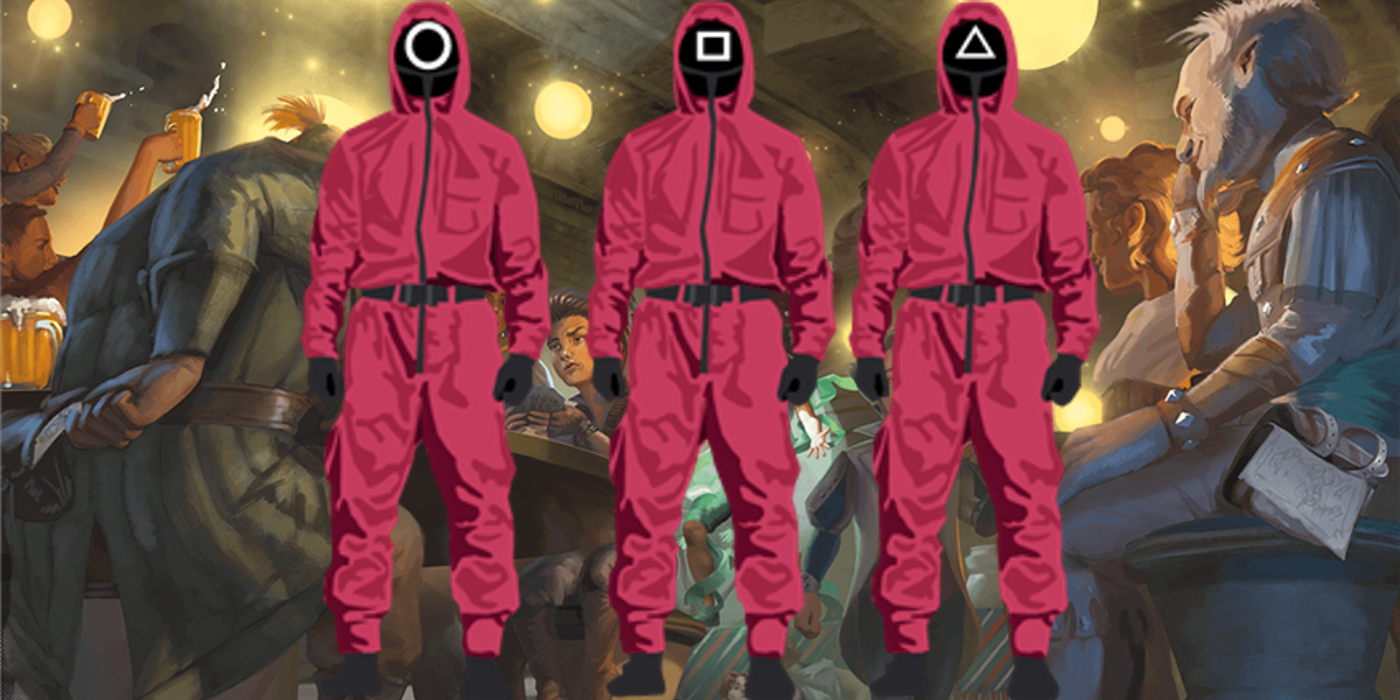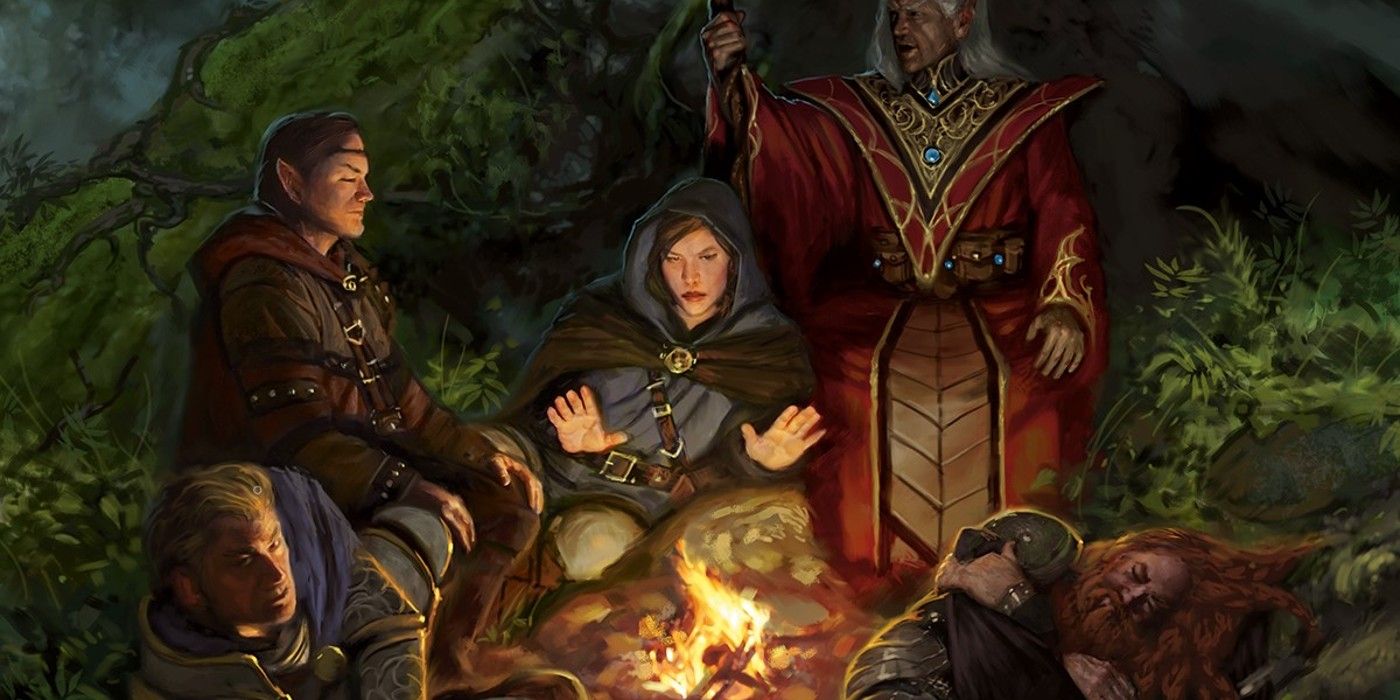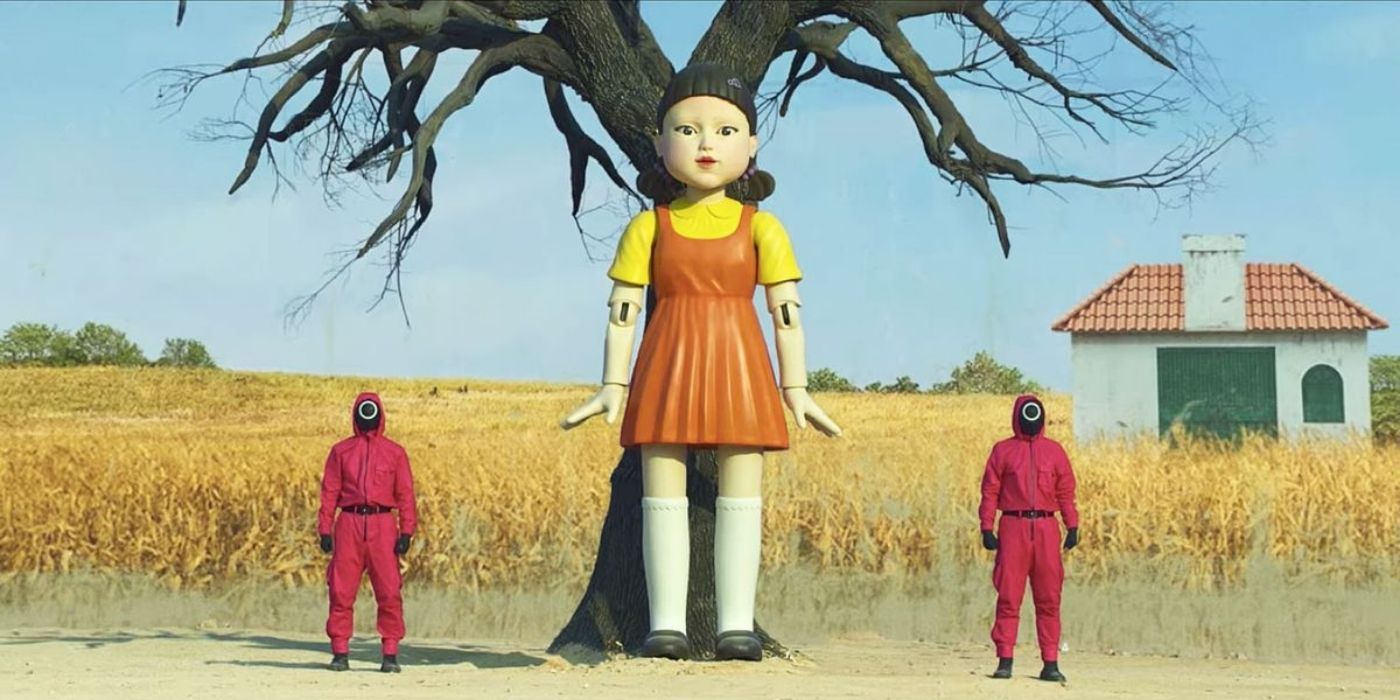The Netflix series Squid Game is an undeniable hit that is full of potential Dungeons & Dragons campaign ideas for 5e. Incorporating ideas from the thriller series could be an interesting way to add a bit of fun to an existing adventure or a starting point for a new D&D campaign entirely. Whether it is a one-shot game, or simply a scenario for existing players to navigate, the possibilities are almost endless. Here are some ideas for how to incorporate Squid Game into a Dungeons & Dragons campaign.
[Warning: Spoilers for Squid Game are below.]
Making a Squid Game scenario/setting a self-contained one-shot D&D campaign would likely be the easiest way to incorporate the concept. Players could make characters with the deliberate intent of competing in such a series of games and subsequently win or lose. Alternatively, players could take on the role of the spectator with the goal of betting on or even disrupting the games. They also could even play as hired help that is trusted to guard the games, resulting in a moral dilemma.
Who is running the deadly games is an interesting topic chalked full of ideas. In Squid Game it was a wealthy businessman, Oh Il-nam, who entertained himself and wealthy friends with the exploitation of less fortunate people. In a Dungeons & Dragons setting anyone from a tyrannical king to a Cult of Bahamut could be behind the insidious games. The players themselves could even be capable if this is a more evil D&D campaign. Maybe even a bored deity himself has constructed the games as entertainment. This could lead to the exploration of an entirely extradimensional space or setting previously undiscovered by, or unknown to, the players.
Squid Game was full of symbolism. From the basic shapes on the masks of guards to the giant glowing piggy bank in the sky, the use of symbolism was ever-present. Incorporating strong symbolism in a campaign is a good way to drive home a Squid Game theme: Infernal glyphs could serve as symbols and developing new and unique symbols for players to decipher is a good way to motivate players. It also offers an opportunity for a puzzle-solving aspect to be added to the quest.
D&D Squid Game Ideas: Handling Character Death
Squid Game is an extremely bloody series. From the first episode, "Red Light, Green Light," and onward, death was a brutal and unavoidable aspect of the games. How to avoid or incorporate character death then becomes a serious issue when incorporating Squid Game's level of violence concept into an existing campaign. One solution was given in episode two of Squid Game. The players simply have a choice to participate or not. The rewards may be incredible but the possibility of character death and loss is real. There is also another option: Players in a Dungeons & Dragons campaign could play both spectator and contestant.
DMs could randomly assign players as "spectators" or "participants," which could add to the suspense that's found in Squid Game. This could serve as a way for players to engage in the games without using their existing (potentially overpowered) characters. It’s also a great challenge for players to roleplay NPCs with lesser skills and abilities, and it's a nice way to create more urgency in the D&D campaign.
D&D Ideas For Using Squid Game's Actual Games
What individual games to play during the scenario is a tough question, and DMs will likely need to think outside of the box. For coming up with D&D-type Squid Games, they can invent the sadistic games a drow culture would play. In the Underdark, players may face multiple impairments. The use of magic could be forbidden and players would need to think of ways to compete in games without the ability to see if they don't have darkvision. Conversely, an Orc Chieftain could have his warriors capture contestants every so many years as a blood tribute and the player characters were just unlucky enough to be scooped up in this lot. The games could be simplistic and brutal in this scenario, matching the kid games that contestants participate in on the show.
The contestants in the Squid Game series had no tools at their disposal during most of the games. Contestants only had prison style jumpsuits, were underfed and in episode 7 "VIPs", they were even stripped of their shoes during the glass bridge game. As a Dungeon Master, this is an opportunity to test what D&D players are made of without armor, magic items, or even material components. It’s an incredible challenge for characters that are very reliant on character wealth to get the job done.
Not every game has to be brutal. The fourth game in Squid Game was a perfect example of this. The contestants were simply paired up, given a bag of marbles and instructed to come up with their own game to determine a winner. Some chose to play games of skill and others played games of chance. This is a good chance to use skills that the players don’t use often. DMs can imagine what unique items could that Tiefling wizard could give players to come up with their own game. They could incorporate a real deck of playing cards at the table and let players come up with their own game of chance. If they choose to use strong magic to alter the DM's outcome, they should be allowed to. That's what Dungeons & Dragons is all about and creativity should be encouraged.
D&D Campaign Ideas: Plant Squid Game Troublemakers
Plot twists are important to the scenario and everything isn’t always as it seems. The guards in Squid Game weren’t all on board with the games at large. A small group of guards was discovered to be running their own organ harvesting scheme on the side. In a D&D campaign, perhaps a group of thieves have infiltrated the games in order to steal the prize. Maybe a group of religious fanatics has entered to disrupt the games. Players could try to anticipate who will discover the infiltrators and what the consequences would be.
Oh Il-nam, the old man responsible for putting on the Squid Game competition, chose to participate himself. Maybe the bored D&D deity likewise takes human form and inserts themselves in the games. Planting clues may help players uncover the deity (maybe he or she wants to be discovered). Perhaps the deity becomes friendly with one of the players along the way. It’s an opportunity for a greater understanding between the characters and the individual responsible for the games, and even a future ally could be gained by this.
In the end, it’s all about creativity when incorporating Squid Game ideas into a Dungeons & Dragons campaign. DMs can focus on parts of the series that had the most impact and stood out the most, and then incorporate it. All adopted aspects from the series are also changeable. Loss of property instead of loss of life is a good alternative for those in fear of losing player characters to a fun side quest. Dwarven runes could be a stand-in for basic shapes on masks. The possibilities are practically endless, and the main goal should still be to have fun.




